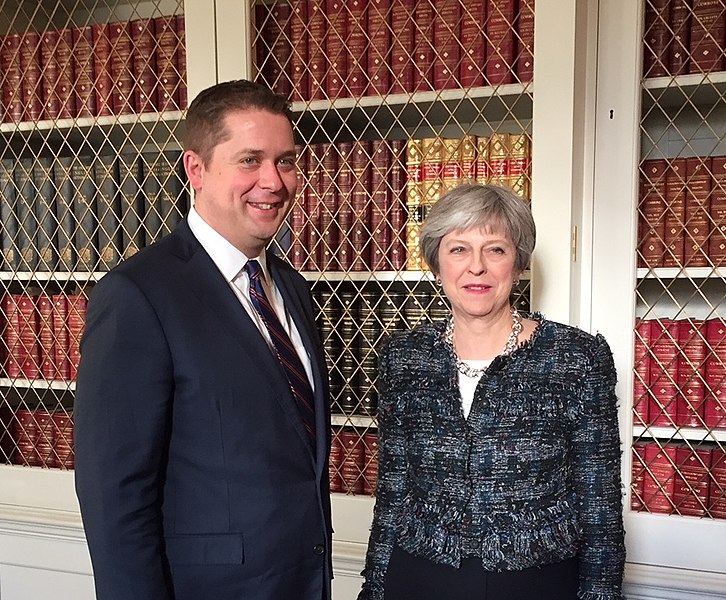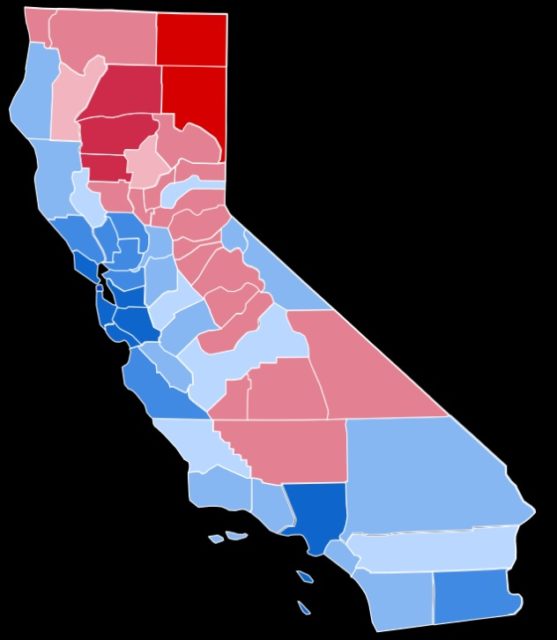You’re like that crazy hobo on the subway demanding everyone justify the moon ferrets. But moon ferrets aren’t real, so why waste a bunch of time explaining that to a stinky hobo. But I’ll try, because I’m a retired accountant, and when people like you try to use stats it is like watching a monkey humping a football. So amusing, but kind of sad.
Larry Correia, “Run Forrest Run!”, Monster Hunter Nation, 2014-11-05.
October 26, 2018
QotD: Mis-using statistics
October 25, 2018
It’s not a “bribe” … it’s an “incentive”!
Terence Corcoran explains why the federal government’s promised “incentive” isn’t in any way, shape, or form any kind of bribe:
Step right up, ladies and gentlemen. Welcome aboard the all-new Canadian Cynical Circular Carbon Circus, the amazing Liberal climate control spectacle that will send you on a great environmental ride into the future.
Come on in! We will pay you to not consume fossil fuels — as individuals and as industries. It’s an economic revolution that takes us beyond blockchain and cryptocurrencies and cannabis into a brave new universe in which money goes round and round and everybody wins. We will pay Canadians with their own money — more than $20 billion over five years in carbon taxes that will raise the price of gasoline by 11 cents a litre by 2022, and ever higher thereafter if not sooner. Everybody pays and everybody wins, except for those who don’t. And some people win more than they pay. It’s better than a lottery!
For the people of Ontario, Saskatchewan, Manitoba and New Brunswick, the federal carbon circus cash comes via a new “Climate Action Incentive Payment.” An Ontario family of four will receive $307 for this year, the amount to be claimed on 2018 income tax returns. A Saskatchewan family will get a Climate Action Incentive Payment of $609.
What’s the Climate Action Incentive Payment for? The Liberal plan unveiled by Prime Minister Justin Trudeau and Environment Minister Catherine McKenna Tuesday doesn’t specify. What are taxpayers in the four provinces being incented to do, exactly, with this new wad of free cash? There is only one explanation: Vote Liberal in 2019!
The payments are based on a 2019 carbon price of $20 a tonne, rising to $50 by 2022. As the carbon tax goes up, Ontario families will receive $718 in 2022 and Saskatchewan families $1,459. And there will be more to come, presumably, since the latest doomsday scenario from the UN Intergovernmental Panel on Climate Change — the font of all speculation and data manipulation on climate issues — warned that by 2030 (only 12 years from now) a carbon price of somewhere between $135 to $5,500 per tonne would be needed to keep global warming below 1.5 degrees Celsius.
Prometheus – The Making of Man – Extra Mythology – #2
Extra Credits
Published on 22 Oct 2018Join the Patreon community! http://bit.ly/EMPatreon
As the age of heroes faded and monsters were cast from the world, Zeus brought a task to the wisest of titans, Prometheus and his brother Epimetheus. They were to create the animals and form man to populate the upcoming age — which also lead to the creation of Pandora (and her box of sorrows).
Every publication in Canada must have had lots of volunteers for this story
In the National Post, Marie-Danielle Smith gets high for science!
I just remembered I am supposed to be writing.
I am stoned on legal weed, which finally came into my hands this morning after six days of waiting. Thank you, government!
It is a different thing to get high alone — to get high alone for work reasons, right after question period. I’m sitting at my dining room table, drifting off every now and then to examine the patterns on my stuccoed walls or to focus, intensely, on the album I am listening to, the one that Kurt Vile and Courtney Barnett collaborated on. It would be a different thing to get high with the two of them.
The first thing you notice, after opening the cardboard box, which is just a little too large for your knapsack (backpack? knapsack? backpack?) … uh, you notice how much packaging there is. Tape. Crumpled-up papers. A box with government warnings and the logo of the licensed weed producer. A plastic bottle inside with a child lock cap that reminds you of Advil.
“She’s so easy,” sing Courtney and Kurt, repeatedly. Such a good album. This song has been on forever. Time stretches out. I’ve smoked a sativa-heavy hybrid strain called “Super Sonic,” which is supposed to make you feel creative rather than sleepy. On the Ontario Cannabis Store website, it’s described as having “a strong, earthy, sweet aroma, reminiscent of Quantum Kush.” I don’t know what Quantum Kush is but maybe our prime minister can explain it? (Remember that time? Anyway.)
Of course, not everyone is impressed:
I’m thinking of trying to write one sober, see how that goes https://t.co/woerC0verT
— Colby Cosh (@colbycosh) October 24, 2018
The History of Australia
History With Hilbert
Published on 23 Aug 2017The entire history of Australia from the earliest humans until somewhere after World War II where I lost interest.
QotD: The unique situation of Israel
In 1948, one internationally recognized sovereign state (Israel) was invaded by the armies of various neighboring sovereign states (Jordan, Egypt, Syria, Iraq, Lebanon). At the end of that war, much of the former British Mandate of Palestine was in Israeli hands, but the West Bank wound up with Jordan and the Gaza Strip with Egypt. Over the next two decades, nobody referred to Egypt’s or Jordan’s exercise of its sovereignty in those lands under loaded terms such as “settlement”.
In 1967, the Arabs tried again to wipe out Israel, and again failed. And this time their defeat was even more total: Egypt lost the Gaza Strip (and the Sinai) and Jordan lost the West Bank. That was half-a-century ago. One of the most basic laws of war is: to the victor the spoils. If you launch a war and you lose, then the guy who took your territory is the one who determines its future. Instead, the “international community” decided to intervene in the matter in a way it has in no other supposed boundary dispute.
Thus began the “Palestiniazation” of the problem. Uniquely in such matters, the victorious sovereign state is forbidden from returning the spoils of war to the defeated sovereign states – Jordan and Egypt. Instead, it can only treat with the designated representatives of “Palestine”, who … have no interest in nation-building, or capacity for it, only in Jew-killing.
To repeat: the “international community”‘s treatment of this issue is like no other boundary dispute of the last 200 years. Maybe that’s because this situation is unique to one small patch of land in the Middle East. Or maybe it’s because the “international community” really really doesn’t like Jews.
I say that Israel (independent since 1948), Jordan (1946) and Egypt (1922) are all sovereign states entitled to act in their own interests, and live with the consequences – especially after two or three generations.
Mark Steyn, “License to Dye”, Steyn Online, 2016-12-30.
October 24, 2018
Scheer’s campaign opening has about as much attraction as a cold bucket of sick
Some guy we’re supposed to believe is the leader of Her Majesty’s Loyal Opposition … Andrew Shear? Shea? No, that’s not it. Something like Scheer? Yeah, maybe it’s Scheer. He’s been in some kind of witness protection for the last year or so, I guess. Anyway, he’s finally emerged to announce the start of the Conservative Party’s year-long campaign to get Justin Trudeau re-elected and to protect our sacred Supply Management system.
No, wait. That’s not quite it. Oh, it’s to get Scheer elected? Okay, then. Got it.
In the National Post, Colby Cosh attempts to find reasons for Canadians to support the Tories next year:
Andrew Scheer published an “open letter to Canadians” in the Toronto Sun this Saturday. “Sunday marks exactly one year until the next federal election,” the federal Conservative leader observed, proceeding thereupon to a critique of Justin Trudeau’s government. As someone who is still trying to take stock of Scheer, I read the letter hoping for clues to his plan of attack for the 2019 election. I’m afraid it merely served to emphasize how much Scheer has remained on the defensive since winning the Tory leadership almost a year and a half ago.
That is part of the issue here: does it seem to you like a year and a half since Scheer became leader? Forgive me a very subjective observation, but I found myself hardly believing that we are much closer in time to the next election than we are to the choosing of an opposition leader who still seems like the enigmatic new guy. What are his signature issues? I am afraid the first answer that springs to mind is “dairy supply management” — which is a continuing controversy that has exposed Scheer to embarrassment, and has helped to split his party, albeit in what is likely to be an electorally insignificant way. (Maxime Bernier won’t be the next Prime Minister of Canada, but party morale is a thing in elections.)
The other major issues that have presented themselves to Scheer as opportunities haven’t proved much more helpful. When it comes to the federalization of carbon taxation, Scheer still has no good answers when he is called upon to reconcile his hypothetical support for emissions reductions with his opposition to the Trudeau plan. He doesn’t like carbon taxes, period, which will play well with climate skeptics who have three-SUV garages; I do not underestimate the impetus of that voting bloc, but the Conservatives own those voters already. Scheer also cornered himself into a lame position on the campus free-speech wars, and he is pulling sour faces about marijuana legalization, even though he is one of the few Canadian politicians who will admit to having smoked the stuff personally.
Kingdom of Majapahit – Lies – Extra History
Extra Credits
Published on 20 Oct 2018Our fantastic writer Rob Rath reviews the mispronunciations we made, the sources we used, and the extra stories we ran out of room to fit into our series on the Kingdom of Majapahit.
Relief efforts: https://secure2.oxfamamerica.org/page… and https://kopernik.info/en/donate/palu-…
Join us on Patreon! http://bit.ly/EHPatreon or http://bit.ly/EMPatreon
Temporal privilege
In the latest issue of Libertarian Enterprise, Sarah Hoyt discusses reading a recent historical novel that she nearly threw at the wall:
What brought about this rant is that I just read a Pride and Prejudice Variation written by someone who swallowed Dickens hook line and barbed socialist sinker.
Dickens was an amazing writer. What he was not was an historian or an impartial observer. What he put in his books has tainted people’s perception of the past and encouraged the cardinal “socialist virtue” of envy. It causes people to think those richer than themselves are callous bastards. It teaches people to see the past through that lens.
This book was almost walled when the woman assured us that the middle and upper classes did not care about the disappearance of a serving-woman.
It wasn’t many years after that the murder of a series of prostitutes set Victorian England aflutter, and yes, that included the upper and middle classes.
In the same way she waxes pathetic about how death was common among the poor in the Regency. B*tch, death was common in the Regency, period. If your entitled, propagandized ass were plopped down in a society with no antibiotics and uncertain house-heating, you’d learn really quickly how common. Young ladies in the upper reaches of society routinely made two baby shrouds as part of their trousseau. They were expected to lose at least that many children. And while we’re talking of children, yeah, death in child birth was really common too. As was death in any of the male occupations which, as is true throughout history, took them outside the house. Even noblemen were around horses a lot, and spent quite a bit of time — if they were worth their salt — managing their own lands, fraught occupations in a time when any wound could turn “septic” and any cold could turn “putrid” and carry you off.
Yeah. The people in these close-to-the-bone societies didn’t give money to people who’d waste it. They sometimes set conditions on distributing largesse. And they had definite opinions on what behaviors were “good” and which “bad.”
They weren’t tight-ass moralists, as the left imagines. They were following precepts and behaviors proven to lead to success. Mostly success in staying alive.
They were poorer than us and in that measure they were a lot more realistic.
They had to be. The other way lay death.
Spitting on our ancestors for not obsessing about gender-fluid trilobites is in fact the ultimate expression of “temporal privilege.” The left is yelling at people poorer, unhealthier and less able than themselves.
And they’re proud of it.
How long can you go without sleep? | James May’s Q&A (Ep 14) | Head Squeeze
BBC Earth Lab
Published on 5 Apr 2013James May talks us through how long you can go for without any sleep.
QotD: The diminishing importance of the Russian revolution of 1917
Few 20th-century historians doubted that the 1917 Russian revolution was one of the most influential events of their time, indeed of all time. As the centenary commemoration approaches, however, it seems remarkable how far and how fast the ideology that inspired Lenin and millions of his worldwide followers has receded in significance. Many are the imperfections of capitalism, but almost nobody outside Jeremy Corbyn’s office any longer supposes that communism, least of all the old Soviet brand, offers a credible alternative. This would amaze our grandparents’ generation on both sides of the struggle.
The novels of C.P. Snow are indifferent fiction but intriguing middle-class social history. During the interwar era, many of the intelligent acquaintances of Lewis Eliot, Snow’s fictional alter ego, took it for granted that socialism, or perhaps communism, not only should but would prevail as the guiding doctrine of most democracies.
Lower down the social scale, Clyde shipworkers, indeed most of the world’s industrial classes, saw the Bolsheviks as harbingers of hope. The bayonets thrust into the bosoms of the imperial family in the cellar at Ekaterinburg roused a pleasurable frisson in some radical hearts. Ten Days that Shook the World, the American reporter John Reed’s eyewitness account of October 1917, conveys the thrill the revolution evoked among those who, like himself, considered capitalism doomed.
Max Hastings, “The centenary of the Russian revolution should be mourned, not celebrated”, The Spectator, 2016-12-10.
October 23, 2018
Austria During World War 1 I THE GREAT WAR Special
The Great War
Published on 22 Oct 2018The Austrian part of the dual monarchy that was the Austro-Hungarian Empire experienced the war quite distinctly and the inner political machinations directly influenced the outbreak of the war.
Myers-Briggs Type Indicators as a “variety of psychobullshit rune-gazing”
In the latest issue of Reason, Katrina Gulliver reviews a new book on a pop psychology notion that escaped into the wild for a generation, wreaking havoc in corporate HR departments across the country:
The Myers-Briggs test and others like it were huge in the corporate world in the 1980s and ’90s. Individuals took them to see what kind of careers they should pursue; H.R. offices used them to decide who to hire or promote. In The Personality Brokers, Merve Emre explores how, precisely, this variety of psychobullshit rune-gazing was born.
Briggs and Myers were a mother and daughter who shared a personal fascination with psychology. Katharine Briggs, born in the last quarter of the 19th century, was one of the few women of her generation to gain a college degree. Like most female members of the upper-middle-class in her time, however, she didn’t pursue a career, instead marrying young and raising a family. Rather than the chemistry she had studied at college, children became her research subject.With an intensity that sounds frightening, Briggs believed she could develop a scientific approach to raising well-behaved, intelligent children. She seemed to do a good job with her daughter Isabel, and other parents soon sought her advice. Briggs was well-connected — her husband was a Washington bureaucrat, so of course she knew magazine editors. Soon she was writing columns for various publications about ideal parenting and child behavior.
As a devotee of psychology, she developed a correspondence with Carl Jung. She drew on his psychological theories to interpret the personalities of kids, the better to advise their parents on behavior management. The 16 “types” of the Myers-Briggs index directly relate to Jung’s thinking, and Jung’s approval of her ideas offered validation for her explorations.
But the commercial Myers-Briggs test came later, and it was far more her daughter’s achievement. Isabel Myers was also fascinated with psychological type. But being a generation younger, she was better placed to pursue this professionally. Again, she had the advantages of social connection: Her husband was an attorney, and she happened to know Edward Northup Hay, one of the first personality consultants in the United States.
In 1943, Hay allowed Briggs — despite her having no formal qualifications or experience — to offer her test to his clients. The takers were few: mostly small outfits, sometimes just a single test for a potential employee. She continued working to perfect the evaluation, trying it on friends and neighbors.
Quantum Computing – The World of the Future – Extra History – #6
Extra Credits
Published on 21 Oct 2018Credit to Alisa Bishop for her art on this series: http://www.alisabishop.com/
What does the quantum revolution mean today? We talk about quantum computing application possibilities in machine learning, cybersecurity, environmental science, and more.
A tremendous thank-you to Alexander Tamas, the “mystery patron” who made this series possible. We finally found room in our busy production schedule to create and air this series alongside our regularly scheduled, patron-approved Extra History videos. A huge thank you to the multiple guest artists we got to work with, to Matt Krol for his skillful wrangling of the production schedule and keeping everyone happy, and to our Patreon supporters for your patience and support.
Support us on Patreon! http://bit.ly/EHPatreon
California (secessionist) dreaming
In the latest Libertarian Enterprise, L. Neil Smith suggests that the kindest thing to do to California is to allow it to secede from the Union:
… some Californians bleat that they want to secede from a United States that threatens to make them straighten up and fly right. Superficially, that might be a workable idea: on paper, California has one of the largest, most powerful economies in the world — bigger than that of many independent nations. It has a long, wonderful coastline and a couple of really good natural ports. Its agricultural sector is second to none. There is oil and gas within easy reach. It has no real military defenses, but I’m sure they’d be more than willing to leech off America’s defenses, our Navy, our Air Force, and our nuclear umbrella, like the deadbeat pajama boys they resemble, living in their mothers’ basements.
But wait. On the reasonable assumption that the California secession movement is limited to people in the counties that voted for Hillary Clinton, and that people in the counties who voted for Donald Trump do not want to secede, I consulted a California county-by-county election map for 2016. Blue counties dominate all but a tiny spot on the northern coast, which is too bad; most of the interior — the most productive part of the state — is bright red.
So here’s my brilliant idea. Instead of fighting another bloody, stupid, senseless War of Secession like the one we had in 1865, let’s grandly and magnanimously permit the state of California to secede — even insist on it — one county at a time. Those counties that vote to secede may do so and create the People’s Republic of Californistan, or whatever.
In exchange for defending this dog’s breakfast of a polity, we will keep all of our military bases and installations, somewhat like Guantanamo Bay Naval Air Station in Cuba. I believe the legal term is “adverse possession”. Those counties that do not vote to secede — we wouldn’t want them to become like the captive peoples and nations of Europe during the Cold War — may remain in the Union, joining the adjacent state (mostly Nevada) or forming their own. To paraphrase the Borg, “We will add their productiveness to our own.”
However the trouble (for California, anyway), if you look at the map, is that county-by-county secession leaves the people’s Republic without visible means of support, a vagrant state, as it were, full of pencil-neck politicos and other worthless parasites, guilty of loitering on our Left Coast. They’re already bankrupt, after decades of Leninist-Stalinist policies. Now they will never recover with their productive counties gone — and we get their avocados!
Let them eat software.







